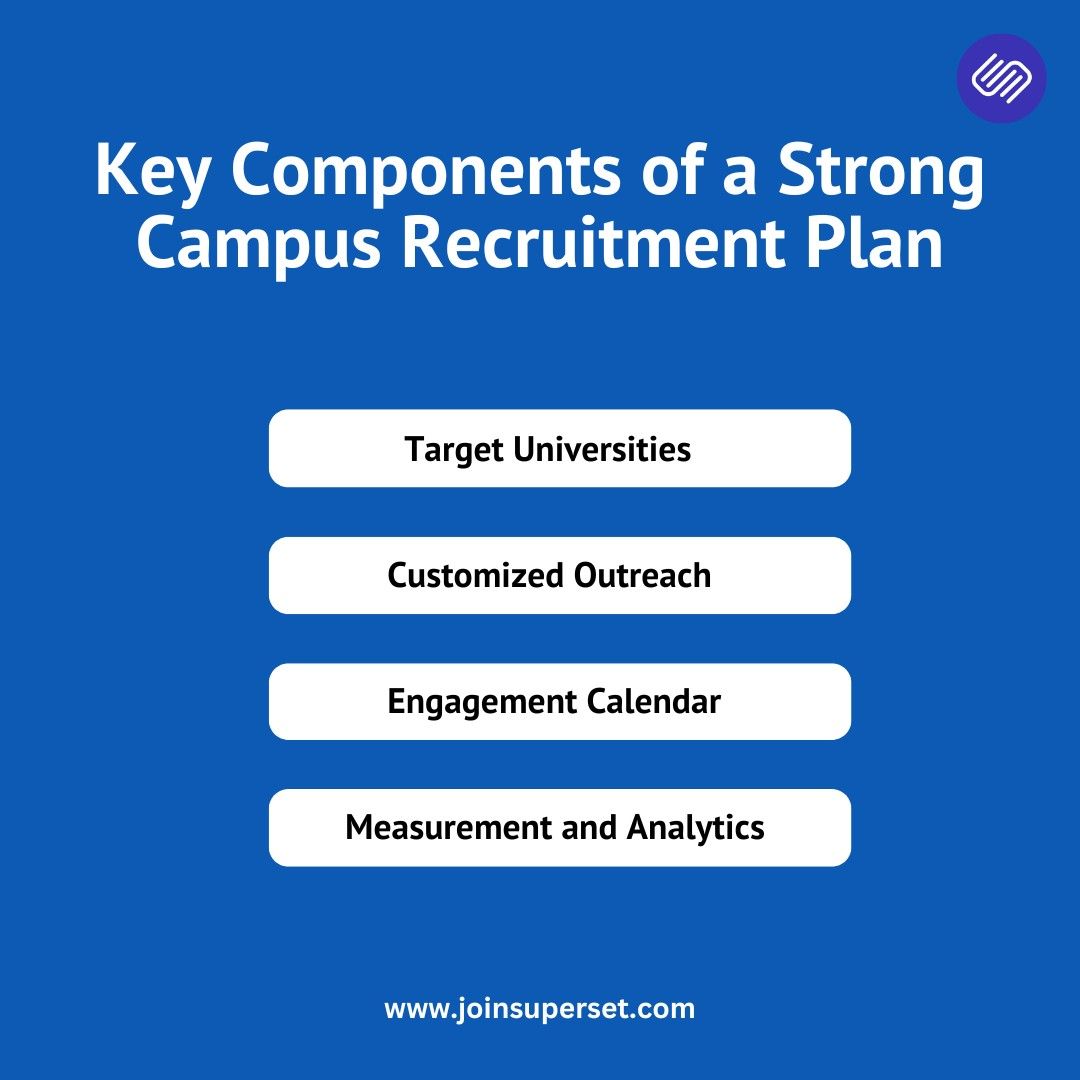Campus recruiting has evolved from a traditional face-to-face event to a dynamic and engaging process designed to attract top talent early in their educational journey. With the competition for talent intensifying, companies and HR managers must stay ahead of the curve by utilising innovative engagement tactics. This blog explores the best practices for campus recruiting and how organisations can implement these strategies to capture top-tier candidates before graduation.
1. Understanding the Importance of Early Engagement
To effectively recruit talent, HR managers must realize that engagement with potential candidates should start early, as soon as they enter university. Top students often plan their careers well in advance, and companies that create an early presence on campuses are more likely to become their employer of choice. Engaging early allows your organization to nurture relationships and build brand awareness among students, making them more inclined to choose your company when they start looking for full-time employment. This approach is a key element of any successful campus recruitment plan.
Why Early Engagement Works:
- Increases Brand Loyalty: Building brand loyalty early ensures students are familiar with your company’s culture, mission, and opportunities.
- Develops Long-term Relationships: By engaging early, you create a pool of potential hires who are already connected to your company, reducing recruitment costs later.
- Reduces Recruitment Pressure: Last-minute recruitment drives can be stressful. Engaging students early helps reduce the pressure of filling positions at the last minute.
2. Leverage Digital Tools and Social Media
The modern campus recruiting landscape relies heavily on digital tools to engage students where they spend most of their time online. Social media platforms, career portals, and mobile apps allow HR managers to reach students quickly and effectively.
Key Digital Platforms:
- LinkedIn and Career Portals: Leverage LinkedIn groups or create specific job listings on university career portals.
- Webinars and Virtual Career Fairs: Host webinars and participate in virtual career fairs to engage with students without geographical constraints.
Using a recruiting software platform like Superset can automate many of these processes, allowing HR teams to send personalized messages, track interactions, and monitor applications in real-time.
3. Develop an Effective Campus Recruitment Plan
Having a well-thought-out campus recruitment plan is crucial to capturing top talent. The plan should outline strategies for outreach, engagement, and hiring while considering the specific needs of the company and the characteristics of the universities you’re targeting.
Key Components of a Strong Campus Recruitment Plan:

- Target Universities: Identify target universities based on their programs, reputation, and alumni success in your industry.
- Customized Outreach: Tailor your recruitment messaging to match the values and interests of students at each school.
- Engagement Calendar: Schedule regular interactions throughout the academic year, including workshops, competitions, guest lectures, and internships.
- Measurement and Analytics: Use data to track the success of each engagement tactic, measuring metrics such as the number of applicants, internship conversion rates, and hire quality.
Incorporating a campus recruitment management system can streamline this process by offering a centralized platform to manage recruitment activities, including job postings, candidate communications, and interview scheduling.
4. Create a Campus Ambassador Program
One of the most effective campus recruiting best practices is to develop a campus ambassador program. This involves enlisting current students to act as representatives of your company on campus, promoting your brand among their peers.
Benefits of a Campus Ambassador Program:
- Peer Influence: Students trust the opinions of their peers. Ambassadors can build trust and spread positive word-of-mouth about your company.
- Continuous Presence: Even when your company isn’t physically on campus, ambassadors help maintain a continuous presence and engagement.
- Real-time Feedback: Ambassadors can provide valuable insights into campus trends and the perceptions students have of your company.
Campus ambassadors should receive thorough training and be provided with resources such as branded materials, exclusive access to company events, and incentives for performance.
5. Host Interactive Recruitment Events
Traditional career fairs can be static and monotonous. To stand out, companies should host interactive and engaging recruitment events. The more unique and hands-on these events are, the more memorable they will be for students.
Types of Interactive Recruitment Events:
- Hackathons: These competitions challenge students to solve real-world problems within a limited time frame, offering a glimpse into the skills and creativity of potential hires.
- Case Study Competitions: Ask students to analyze and present solutions to industry-specific challenges. This helps assess critical thinking and teamwork skills.
- Workshops and Webinars: Offer students the opportunity to attend virtual or in-person workshops led by industry experts from your company. This is a great way to showcase your company’s thought leadership.
- Speed Interviewing: Speed interview sessions allow HR managers to engage with many candidates quickly, assessing initial compatibility before moving to the next stage of recruitment.
To manage these events effectively, recruitment management systems and recruiting software platforms can automate invitations, reminders, and feedback collection, ensuring a smooth and organized process.
6. Provide Internship and Co-op Opportunities
Offering internships and co-op programs is an excellent way to attract top talent early and test their suitability for full-time roles. These programs provide students with hands-on experience, allowing them to apply their academic knowledge to real-world challenges within your company.
Why Internships are Essential:
- Pipeline for Future Hires: Internships serve as a pipeline for future hires, reducing the cost and time needed to train new employees.
- Cultural Fit: Internships allow both the company and the student to determine whether they are a good cultural fit before committing to full-time employment.
- Skill Development: By investing in interns, you help develop their skills, ensuring they are job-ready when they graduate.
Organizations with the best campus recruitment programs use internships as part of their long-term talent acquisition strategy, hiring top-performing interns directly after graduation.
7. Offer Personalized Candidate Experiences
Personalization is key to engaging with today’s student population. They are used to tailor experiences from the brands they interact with, and the same expectations apply to their job search. One of the emerging campus recruiting best practices is to offer personalized recruitment experiences.
Tactics for Personalizing Candidate Experiences:
- Custom Communication: Use data to personalize emails and messages to students, addressing their specific career interests and aspirations.
- Targeted Content: Develop content that resonates with individual majors or departments, such as blog posts, videos, or case studies.
- Tailored Events: Organize recruitment events targeted at specific programs or schools, addressing the unique needs of students in those areas.
A campus recruitment management system can automate these personalized experiences, sending customized content and event invitations based on a candidate’s profile and interaction history.
8. Use Data to Refine Your Campus Recruitment Strategy
Continuous improvement is critical in campus recruitment. By collecting and analyzing data, HR managers can refine their strategies to better engage students and identify areas for improvement.
Data-Driven Insights:
- Identify Top Sources of Talent: Use data to determine which schools, programs, and events produce the highest quality candidates.
- Track Engagement Levels: Monitor engagement metrics, such as email open rates, event attendance, and application rates, to gauge the effectiveness of your outreach efforts.
- Optimize Conversion Rates: Analyze the conversion rates of candidates from initial engagement to hire, adjusting your strategy to maximize ROI.
By integrating a recruitment management system, companies can automate the collection and analysis of this data, ensuring a data-driven approach to best campus recruitment programs.
9. Build Long-term Relationships Through Alumni Networks
A powerful yet often overlooked campus recruiting best practice is tapping into alumni networks. University alumni who have successfully transitioned into your company can act as valuable ambassadors, strengthening the connection between the campus and your organization. Alumni provide credibility and firsthand experience, making it easier for students to visualize their journey in your company.
Leveraging Alumni for Campus Recruiting:
- Alumni-Led Workshops: Invite alumni to speak at workshops or recruitment events, sharing their career progression and how your company helped them achieve their professional goals.
- Mentorship Programs: Establish a mentorship program where alumni mentor current students. This engagement can significantly enhance your company’s visibility and influence on campus.
- Social Media Campaigns: Feature alumni success stories on your company’s social media platforms and university job portals. Seeing former students thrive in your organization can create a strong incentive for potential candidates.
Alumni networks foster long-term relationships between universities and companies, and this connection helps ensure a steady flow of qualified candidates over time. By integrating alumni into your campus recruitment management system, you can track which individuals have participated and measure the impact of alumni-driven engagement.
10. Create Customizable Onboarding and Training Programs
Once you’ve captured top talent through your recruitment efforts, maintaining a smooth transition from student to full-time employee is essential. One way to stand out in your recruitment efforts is by offering customizable onboarding and training programs tailored to individual needs and career aspirations. Providing students with a clear path for growth and development significantly increases your retention rates and makes your recruitment process more attractive.
Key Elements of Customizable Onboarding Programs:
- Personalized Learning Pathways: Design training modules that cater to individual skills and career goals. Offer a flexible, self-paced learning experience that allows new hires to focus on areas where they need improvement.
- Continuous Feedback: Incorporate regular feedback sessions to track progress and ensure the new hire’s development is on track. This reinforces the perception that your company is invested in their personal and professional growth.
A recruiting software platform can manage onboarding programs, track the progress of new employees, and ensure consistent engagement through structured feedback loops.
11. Optimize Employer Branding to Appeal to Students
In today’s competitive job market, students have more options than ever. To capture top talent early, companies need to optimize their employer branding efforts. Your employer brand reflects your company’s values, culture, and reputation, all of which are crucial for attracting quality candidates from campuses.
Best Practices for Strengthening Employer Branding:
- Showcase Company Culture: Students are drawn to workplaces where they feel they can fit in and grow. Highlight your company’s work-life balance, diversity, career development opportunities, and commitment to social responsibility through engaging content like videos, blog posts, and testimonials.
- Engage in University Events: Partner with universities to sponsor events, host panels, or contribute to campus-wide initiatives. Active participation in academic settings helps build your company’s credibility and brand recognition.
- Offer Value Beyond Employment: Besides job offers, provide students with opportunities for learning and growth. Host free webinars, create resource hubs on your website, or sponsor scholarships. These initiatives demonstrate that your company is genuinely invested in the success and development of students, even before they join your workforce.
With a strong focus on employer branding, companies can better connect with students and build lasting relationships that ultimately lead to successful hires. Implementing a campus recruitment management system ensures that your branding and engagement strategies are consistently aligned and effective.
Conclusion
Innovative engagement tactics are essential for companies and HR managers who aim to capture top talent early in the competitive campus recruitment landscape. From leveraging digital tools and developing campus ambassador programs to offering personalized experiences and refining strategies through data, the key is to engage early, often, and effectively. Utilizing a campus recruitment management system and other recruiting software platforms ensures that companies remain organized, efficient, and adaptable in their recruitment efforts. By implementing these campus recruiting best practices, your company will not only attract the best talent but also build a reputation as an employer of choice among students and universities alike.








